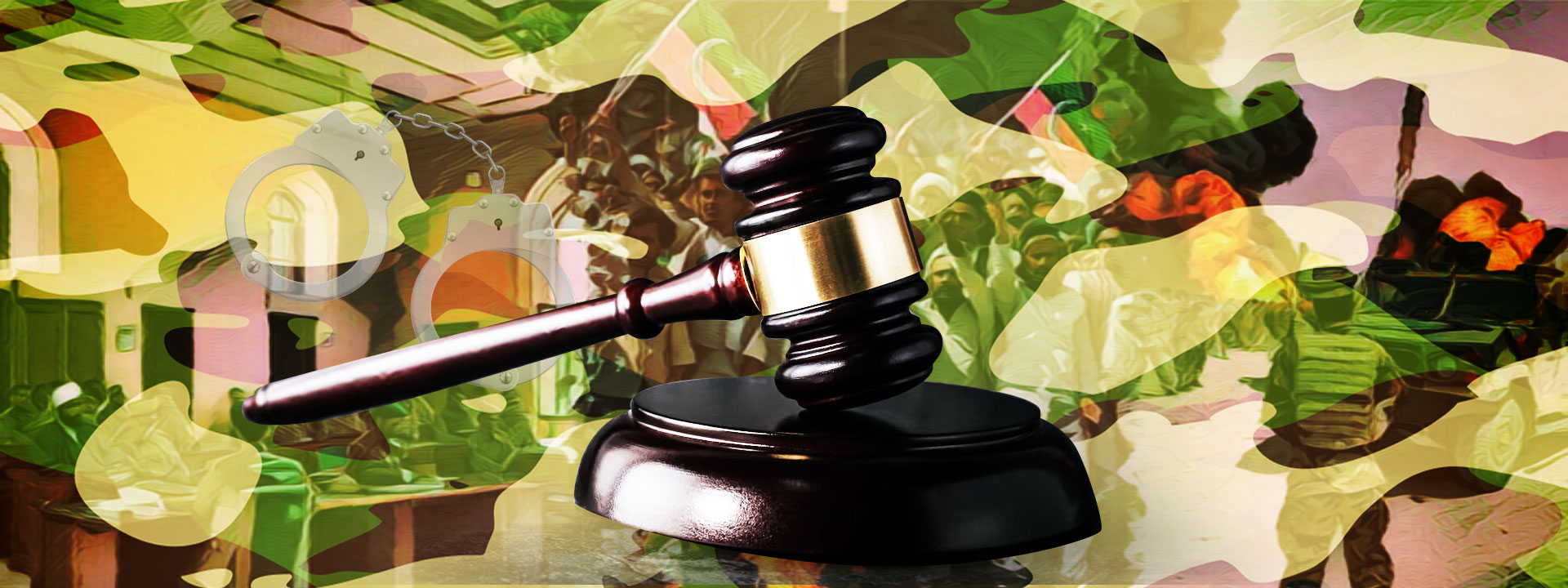|
Getting your Trinity Audio player ready...
|
I
n November 2019, rights advocate Idris Khattak was abducted while he was traveling from Islamabad to his hometown in Pakistan’s northeastern province of Khyber Pakhtunkhwa. There would be no information about what happened to the single father of two girls until eight months later, when it was revealed he had been charged with espionage and was being tried in a military court. Appeals to have his case tried in a civilian court went for naught; he is now serving a 14-year jail sentence.
Khattak’s abduction and subsequent trial and conviction in a military court happened during the administration of Imran Khan. Today at least 102 of Khan’s supposed supporters are at risk of also being tried by a military court – as is Khan himself, if Pakistan’s Interior Minister Rana Sanaullah is to be believed. According to Attorney General Mansoor Usman Awan, the death penalty “can be given” in the cases should “foreign contacts” be involved. But court documents quoted by the Dawn also said that Awan had assured the Supreme Court that no one among the 102 would be facing charges that involve “lengthy” sentences or capital punishment.
For some of those horrified by the violent protests last May 9 following Khan’s arrest on corruption charges (he has about 150 cases filed against him), the former prime minister and his supporters are merely getting their comeuppance.
On Aug. 5 Khan was arrested anew after a court sentenced him to three years in prison for “unlawfully selling state gifts“.
A schoolteacher tells Asia Democracy Chronicles (ADC), “People who attack institutions… it is directly related to terrorism and they should be punished to set an example so nobody will do this next time.”
“There is a difference between peaceful protests and attacking institutions,” the teacher says. “When protesters cross limits and reach an extreme level, then they deserve to be tried in military courts. It is responsibility of state to protect everything, but if state fails to do so then it becomes responsibility of departments to protect the country.”
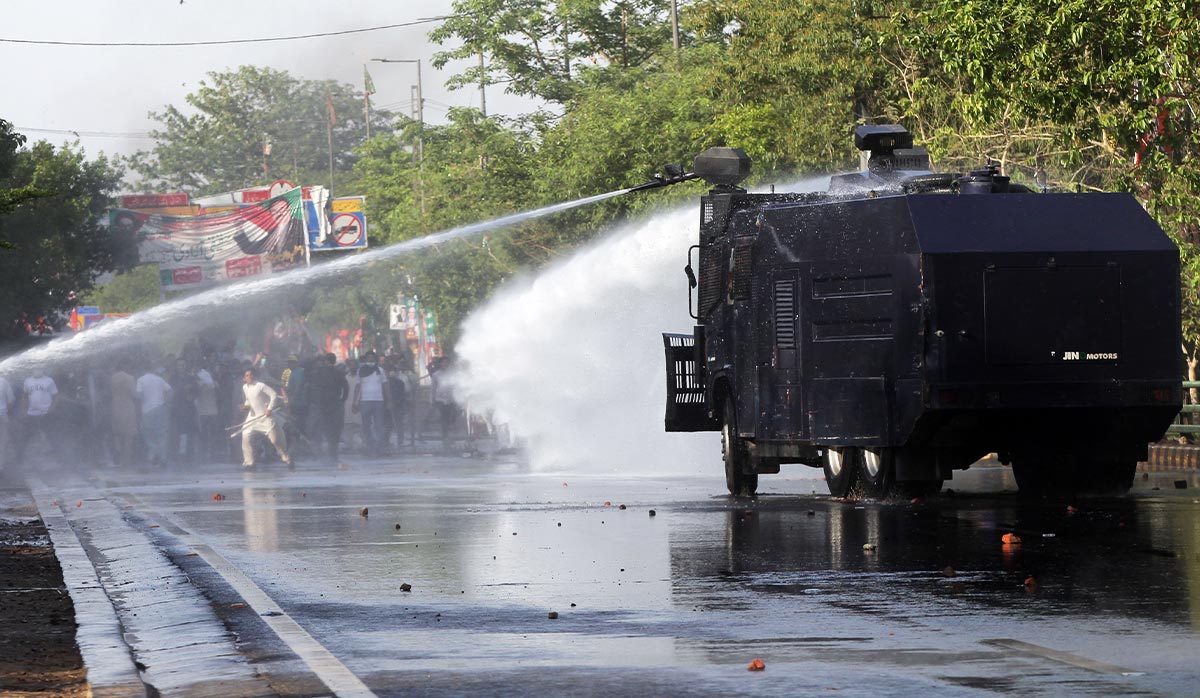
Riots had broken out in several cities across Pakistan on what authorities have taken to calling the country’s ‘Black Day,’ with the protesters attacking mostly military buildings and installations. At least 10 people – all of them protesters – have been confirmed to have been killed in the mayhem, while scores were injured. Thousands have been arrested. Pakistani authorities say Khan instigated the riots, which he denied doing.
Rights advocates and many observers say, however, that there is no instance that would justify having a civilian tried by a military court. They believe this is an issue affecting not only Khan, his party, and supporters, but the entire country. Yet, say the advocates and observers, it has been left unquestioned for far too long, leaving far too many civilians at the mercy of military courts. In fact, aside from Khattak, at least 24 more civilians were tried in military courts while Khan was prime minister, according to the Dawn. Three were eventually sentenced to death, according to a retired military officer quoted by the daily.
Military over civil rule
Today those who may be put at the military dock are more than four times the recorded number of civilians who underwent military trials during Khan’s brief time in office. To observers and activists, the current situation has also made it clear that in Pakistan, military trumps civilian rule.
“We have set certain precedents, which are now coming home to roost,” comments Islamabad-based lawyer Benazir Jatoi.” The first one, she says, is the Pakistan Army Act, which was passed in 1952 and amended in 2015 to allow “military courts to try civilians accused of terrorism-related offenses. “This opened the floodgates and allows terrorism to be defined loosely when required.”
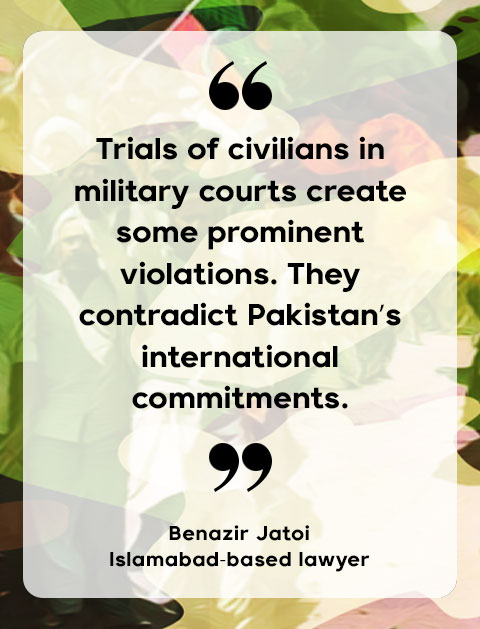
“Secondly,” she says in an interview with ADC, “(even though) democracy has taken hold in the past decade or so in Pakistan, political parties have failed to create consensus to resist military interference in politics. The 2018 elections saw a particularly blatant interference of the establishment in politics, taking us back to pre-2006 and Charter of Democracy between the two major political parties.”
Those two parties are Pakistan Muslim League-Nawaz (PML-N) and Pakistan People’s Party (PPP). In 2006, their then leaders signed the Charter of Democracy whose “basic essence,” explained lawyer Omar Haider Hayat recently in the Nation, “was to refrain from using extra-constitutional means for the purposes of gaining power…..The Charter consisted of, most importantly, constitutional amendments, and laid a sound framework for other matters such as a code of conduct, civil-military relations, and the understanding that free and fair elections were the only way for democracy to prosper in Pakistan.”
PML-N currently heads the ruling coalition in which PPP also plays a major role. They were not voted into power, however. In April 2022, Khan was ousted as prime minister after receiving a no-confidence vote from parliament. Members of his party, Pakistan Tehreek-e-Insaf (PTI), then resigned en masse from the National Assembly, leaving PML-N’s Shehbaz Sharif as the lone candidate for premiership.
Yet for decades now, the power behind the throne – and at times on it – has been the military. In a podcast last May with the U.S.-based online news outlet Intercept, rights activist and former Amnesty International South Asia head Omar Waraich pointed out, “(The) Pakistan military has, at various points in the country’s 75 years, ruled directly for three decades, and then let very weak attenuated forms of democracy run while they still hold onto the crucial levers of power, particularly the economy, national security, foreign policy.”
Waraich said that the two major parties had “poor records” during their previous turns of running the government. He said, though, that “both have records…generally, of resisting military dictatorships.” Now, he said, while both parties are “sitting in government … they’re not really in power.
“Power currently lies with the Pakistan military. They may have a military façade there, but what we see is them operating as if it was a dictatorship without declaring it,” Waraich said.
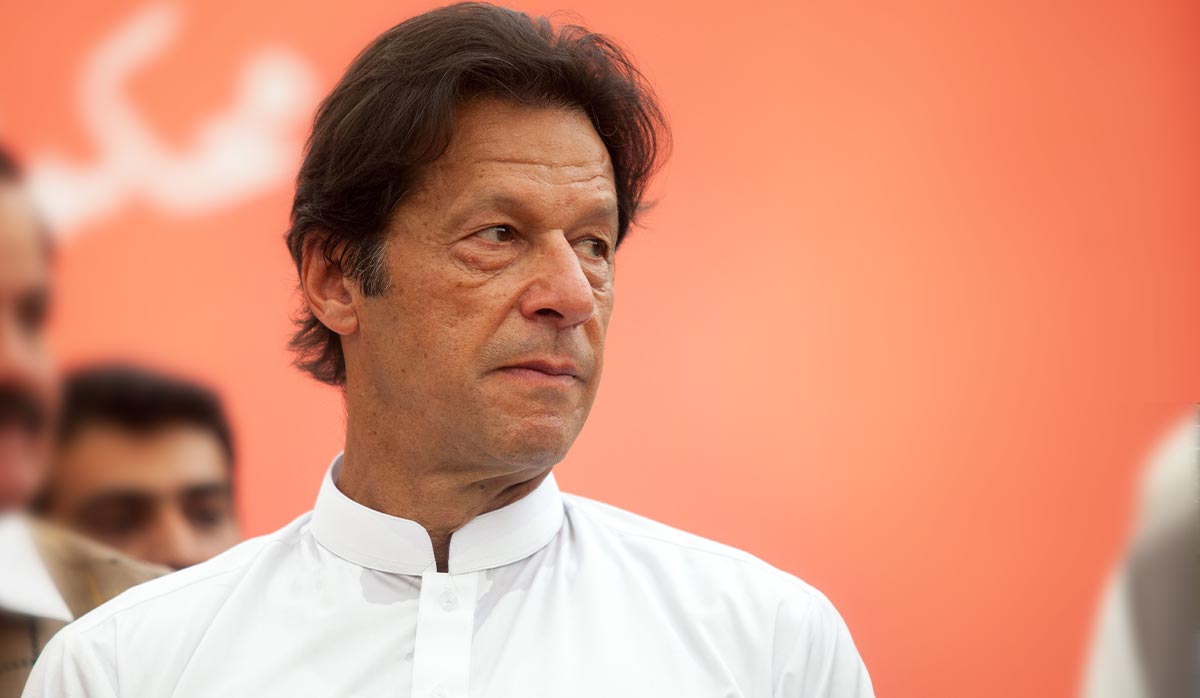
Waraich echoed political experts in saying that the military also played a major role in the Khan administration, having been instrumental in putting the former cricket star in power in the first place. He said that the Khan administration was “very, very unusual” for Pakistan because, said Waraich, it was the first time civilians and the military ruled together in the open.
“You have meetings where it’s the prime minister, the army chief, and the head of the ISI (Inter-Services Intelligence), and this becomes the troika that runs the country, and they don’t hide it at all,” he said. But Waraich said, the military would later decide that Khan had become a liability, partly because it saw him as having a big ego, and partly because he was making too many mistakes – including “alienating key partners of Pakistan” – while doing little to stop the economy from going into a downward spiral.
Military court as a weapon
Now, Waraich and other observers say, the military is determined to stop Khan from regaining power. That the May 9 protesters had mostly military targets in their sights has made the armed forces even more determined to crush Khan, PTI, and his supporters – and the military court has emerged as being part of its arsenal.
“Trials of civilians in military courts create some prominent violations,” says lawyer Jatoi. “They contradict Pakistan’s international commitments, such as the International Covenant on Civil and Political Rights and violate International Humanitarian Law, which allows for military trial in cases where, for example, an armed conflict is underway.”
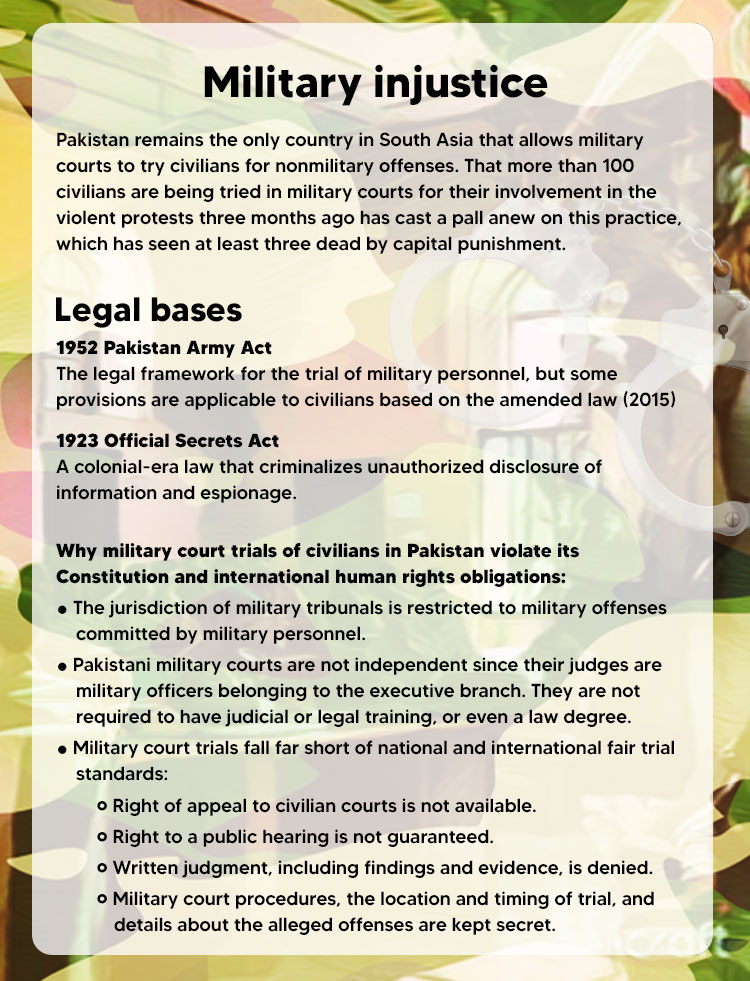
She also says that another violation is that of the constitutional guarantee such as the right to a fair and free trial under Article 10A. But the main issue with military courts, says Jatoi, is that trials there “are carried out in secret – and that raises serious questions on how the accused’s rights are being protected. Even those deprived of their liberty have the right to be treated with dignity and humanity and this feeds into the eventual concept of the right to a fair trial.”
At one of the ongoing Supreme Court hearings on the pleas challenging the trials of civilians in military courts, Attorney General Awan said that all the 102 accused are currently in the army’s custody. He also asserted that all of the accused had participated in the attacks on military installations and property, including the Jinnah House, the Lahore Corps Commander’s official residence, which was set on fire.
In the meantime, Khan’s PTI has been decimated, with many of its members behind bars while some of senior officials have opted to leave it. Khan, who was arrested for the second time as this was being written, remains defiant, even as Pakistan’s mainstream media have been prohibited from showing his picture or mentioning his name.
He is still popular, but some of his supporters seem to have already given up on him having a political comeback. Or perhaps the crackdown on the protesters and PTI last May has made them think twice. In a pre-recorded message released by his party shortly after his recent arrest, Khan asked his supporters not to “sit idly” at home and launch “peaceful protests.” But the dozens who heeded his call across the country were a far cry from the thousands who had poured into the streets just a few months ago.
Still, for Lahore taxi driver Muhammad Asim, who says he was unable to join the May 9 protests because he was too busy working, Khan “should have been given a chance” to complete his term or at least run in another election.
Polls are indeed expected later this year, but whether or not Khan will be able to participate is uncertain. Asim himself thinks Khan’s prospects of ever leading Pakistan again are dim.
“I voted for Imran Khan in the 2018 elections hoping one day I will have better future for my daughters,” he says. “But now all my hopes are lost.’’◉










